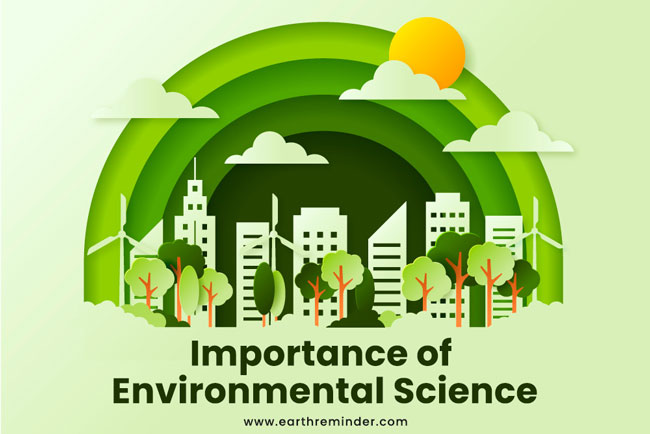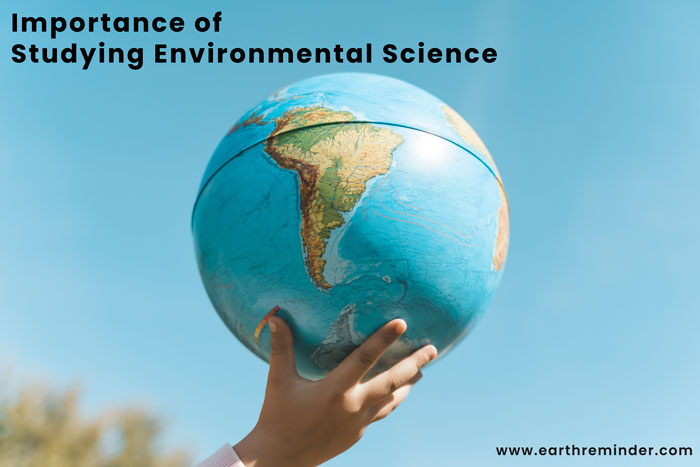What Is the Importance of Environmental Science?
What Is the Importance of Environmental Science?
The environment is an everlasting topic as it positively and negatively impacts us daily. We live, eat and breathe in our environment, and we constantly interact with it to meet our daily needs.
The environment is a topic that is always relevant. It also demonstrates to others that you are enthusiastic about it. It communicates to them that there is a part of their lives that you believe should be discussed; This encourages potential people, clients, and customers to associate more closely with your brand or company’s message.
There are many reasons that tell us the importance of environmental science. We will discuss this below, but first, let’s understand environmental science’s meaning.
Table of Contents
What Is Environmental Science?
In environmental science, the physical, biological, and information sciences are brought together to examine the earth’s great natural systems. During the Enlightenment and early Industrial Revolution, it arose from the fields of natural history and medicine.
Environmental study is an interdisciplinary field of research eager to find solutions for the deteriorating state of our environment. Most people don’t have much knowledge about the importance of environmental science.
Environmental studies will help you to develop an appreciation of environmental causes and effects. From there, you’ll gain the skills needed to build successful careers in related fields. Therefore, it is way too important to learn environmental science.
Why Is Environmental Science Important?
There are several ways in which environmental science is important to us.
It explains how to use resources sustainably
Environmental studies focus on the importance of environmental sustainability. These studies offer a rare chance to gain a better understanding of our planet and how we can best take care of it.
Natural resources are getting depleted rapidly in areas such as soil, air, water, and minerals.
This has created a heavy burden on the inhabitants of this planet. It has become essential to analyze how we can use these resources more responsibly. By preserving our environment, we might be able to save ourselves from further damage.
Mass Movements
Environmental initiatives and awareness programmes also help students in clearing their doubts and building their knowledge on important issues such as climate change and sustainable living. You can learn about various ways of protecting the environment through initiatives like planting trees on campus.
They can also conduct workshops on various pressing issues or join an NGO that directly supports environmental conservation.
Focus on Environmental Development
Environmental science aims to avoid stream pollution and re-educate the general population about the importance of recycling to preserve our available resources.
Based on data-driven planning models, environmentalists seek to direct development towards sustainability. We must use every available resource in the most efficient way possible so that it can be saved for future generations.
Helps in generating Creativity skills
Environmental science promotes the study and understanding of natural and human-caused processes in our natural environment. By researching and investigating complex environmental issues, students develop and enhance essential skills such as critical thinking, problem-solving, and creative thinking.
Environmental scientists develop and advance theories about how and why things happen in our environment through research, investigation, and modeling; This is one of the major reasons why it is important to learn environmental science worldwide.
It Encourages a Healthy Lifestyle
Environmental science allows students to immerse themselves in the natural world around them, whether observing it or learning about it. The information that is given in environmental science courses have done wonders to help improve the health and well-being of countless children today.
Environmental science unites fieldwork and classroom learning to promote health and well-being. Students benefit from the time spent in the field and labs. They learn about ecosystems and reduce stress through a focus on nutrition. Through Environmental science, students get to observe and solve real-world problems such as pest infestations and erosion.
It Empowers Teachers and Students.
Through interactive, hands-on activities, students will investigate the connections between the earth’s ecosystems and develop a deeper understanding of environmental issues.
In addition to learning how major environmental problems have been tackled locally and globally over time, the course helps students examine the contemporary issues that we are facing today—providing examples of solutions that can be implemented today!
It gives educators and students alike a true sense of civic responsibility and stewardship toward the earth. You will come away with the comprehension of understanding the basic concepts of the ecosystem, policy issues, and environmental impact on other species.
It Saves the World from Destruction
An understanding of the relationship between humans and their environment is important to establish a sustainable future. Humans have been abusing and exploiting the environment for years and have caused environmental degradation around the world.
In the absence of a thorough understanding of environmental science, there is a considerable risk that what we know as a home may be lost to extinction.
Environmental science is important because of the growing presence of calamities in our world. Examples of these calamities include flash floods, hurricanes, droughts, and many others. The growing presence of these calamities means that there is a great danger that our planet earth may lead to complete extinction.
Safeguards Future Generations
The discoveries made through the study of this field have led to a better understanding of our natural environment. These discoveries have been implemented into everyday life, and with continued improvement and following nature-related rules and regulations, we are directly saving resources for our next generations.
Importance of Studying Environmental Science
Environmental studies open up opportunities to explore both human and natural systems and to bring the two spheres together. This is achieved through our core principles, which aim to develop your knowledge of environmental issues.
Learning about the environment is a lot more fun than you would expect. It’s an adventure that can take you around the world and make a difference in the lives of others.
The environment lays the foundation for human life. As human beings, our concern for the environment stems from the very fact that we are dependent on the health of the natural world.
We live in a world where many ecosystems are under threat, and with climate change looming, we need to do something about it. The study of all this is a complex issue, and it takes a lot of education to understand what’s going on.
Importance Of Getting a Degree in Environmental Science
By 2026, employment in environmental science is expected to rise by 11 percent, making it one of the fastest-growing professions in the United States. If you’re thinking about pursuing a career that helps protect our environment, you might consider environmental science.
The necessity of environmental sciences is self-explanatory because it is one of the most fundamental branches for sustaining life on planet earth and managing resources. Environmental sciences play a crucial role in maintaining ecosystems on a larger scale as well as playing a vital role in conserving our natural resources.
The environmental sciences are crucial to the survival of the human race; these sciences manage the resources on the planet, making them renewable for future generations. We cannot take conservation measures lightly; if we do, we will end up hurting the present generation and future generations.
A Career in Environmental Science
Whether you want to inspire young minds to appreciate the environment we live in or promote energy efficiency, there are numerous environmental jobs and educational programs available for anyone who holds a passion for the natural world and a desire to help protect it.
Jobs in environmental education are accessible to people with different life experiences, academic backgrounds, and career goals.
Environmental education jobs can be found in formal and informal settings through a variety of fields, including educational advocacy and management. Here is a look at available positions.
Students in Environmental Science classes will be introduced to the effects of natural resources, sustainability, technology, and policy on the environment. This can lead to careers in education, state and national government agencies, or in environmental consulting firms.
Businesses & Government
Sustainability professionals track environmental trends and advise companies on how they can reduce their negative impacts on the environment. They study the effects their business operations have on the environment and devise solutions to increase their overall sustainability.
Environmental Compliance Professionals help organizations meet their environmental obligations and standards. They identify, evaluate, and recommend strategies to reduce emissions and material waste.
Technology
Geology uses the scientific method to address environmental issues. The scientific field of geology examines geological data using the latest technology. Some well-known geoscience fields include earth science, the natural resources and conservation field, and geospatial technologies.
With increased activity in mining, construction, and drilling across the globe comes great responsibility. The need for data interpretation, safety, asset protection, and efficiency of resources is crucial.
Geoscience provides information to environmental industries, blends science with technology to help you address environmental issues wisely.
Education
Environmental scientists are environmental thinkers, innovators, and educators. They work with everyone from politicians and journalists to health professionals and community members to improve environmental sustainability.
A degree in environmental science provides you with a solid foundation on which to build your career in ecology and conservation, giving you the skills needed to manage and restore natural resources.
Conclusion
The field of environmental sciences is a growing area of study which is enlarging due to the increasing number of challenges that the earth is facing. Apart from saving the planet, it has several career opportunities and opportunities for people who are associated with it. Environmental science is a growing field with increased opportunities due to our planet’s health.
For us to have the best possible environment in which to live, work, and play, we need to ensure that our communities are built sustainably.

